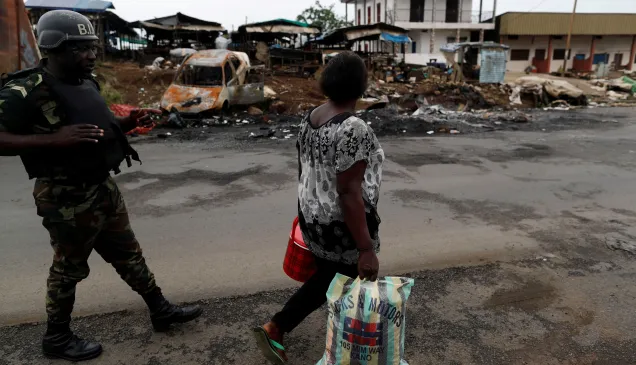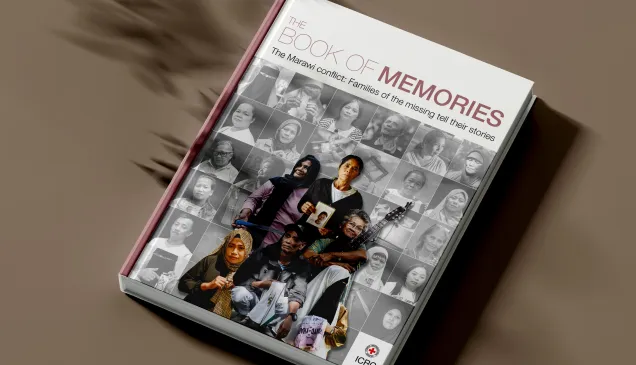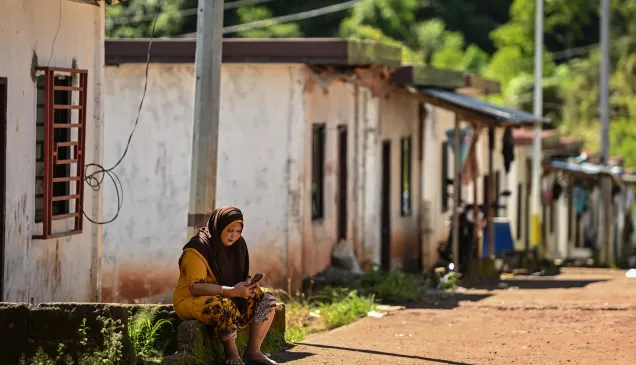Philippines: The arduous road to home

"It was around midnight when some armed men arrived in our village. We were roused from our sleep and all male residents were told to line up. We didn't know what was going on, but we were all terrified. They were looking for some people, they said."
Marvin (not his real name) vividly recounts the event that happened more than a year ago in Barangay Bolhoon in San Miguel, Surigao del Sur. The once tranquil lives of more than 25 families, most of them related to one another, were immediately shattered. The villagers packed up what little belongings they could and headed on foot to the town as soon as the sun rose. The decision to evacuate was unanimous lest they all live in fear.
Surigao del Sur is a province teeming with natural resources and verdant forests. Many indigenous tribes, among them the Manobos to which Marvin belongs to, called this home since the time of their ancestors. They lived idyllic lives and depended mostly on agriculture for their livelihood.
However, in September 2015, a series of violent incidents forced some 3,000 individuals from five municipalities in Surigao del Sur to flee their homes, most seeking refuge at the sports complex or "oval" in Tandag City, the provincial capital. All of them chose to leave their homes for their safety.
"The oval was wide; but since there were so many evacuees who arrived by truckloads, it became cramped. Our community leaders told us it's best to stay together and go as far as possible from our villages," he shared.
What they thought to be several days of refuge in Tandag turned into weeks then months as the situation in their village remained hazy. As in their culture, the tribal leaders conferred and decided to wait until it was safe to return.
While in displacement, Marvin's children got sick one after the other due to the heat inside the tents. They were not used to it since the weather was cooler in the forest. Due to the influx of people, the latrines set up by the local government could not cater to all the internally displaced persons (IDP). The Philippine Red Cross (PRC)-Surigao del Sur Chapter delivered potable water and promoted proper hygiene practices among the evacuees. Additional toilets were built to address their sanitation needs.
The ICRC, with its primary partner the PRC, distributed one-month food supplies and hygiene items several days after the displacement to help affected families and to complement the aid given by the authorities and other organizations. This was followed by another round of assistance in February 2016.
In early September 2016, after almost a year of staying in the sports complex and other host areas, the displaced communities received word that they could already return to their villages after a long negotiation between their representatives, concerned groups, and the authorities. Finally, Marvin and his tribe can now go home.
But the sight that greeted them doused their jubilation and excitement. Their homes were destroyed; grasses and weeds covered their farms, and not one of their livestock survived. A year of displacement took a toll on their shelters and livelihood.
"We all cried. Everything had changed. It was as if we returned to another place. The fighting left us no choice but to leave and when finally, we were able to return, nothing was left," said Marvin, shaking his head.
To help those who were displaced for a year to recover, the ICRC provided each family with half-month food rations consisting of 25 kilograms of rice, 12 cans of sardines, 2 liters of oil, 1 liter of soy sauce, 1 kilogram of sugar, ½ kilogram of salt, and hygiene items. Vegetable seeds were also distributed so they could produce vegetables in their backyards for their own consumption. To support the families to rebuild their livelihood, the ICRC in December distributed various farm tools to each family.
"Our response is based on the urgent needs of conflict-affected communities. By distributing seeds and tools, we hope to support their efforts to rebuild their lives after their long displacement. Having their own farm tools will enable them to work on their fields again and provide for their families," said Olav Sinsuat, head of the ICRC office in Butuan, Agusan del Norte.

Marvin, now back in his village, carries home the food and hygiene items from the ICRC. ICRC/L.delaCruz
In places affected by armed conflicts around the world, 90 percent of the consequences and destruction are borne by civilians. They are displaced from their homes, lose their livelihood, get injured or killed. They constantly face uncertainty and danger.
The ICRC's exclusive humanitarian mission is to protect the lives and dignity of victims of armed conflict and other situations of violence. The relief assistance for the displaced communities in Surigao del Sur covers the essential needs of individuals, and their social and cultural norms given primary consideration.
"We were never part of the conflict and yet, we have suffered so much. We're thankful that organizations like the ICRC was there to help us when we were at the oval. Now that we've returned, the assistance they provided is very timely and needed as all of us try to start again," said Marvin as he prepared to carry back home the provided supplies.



